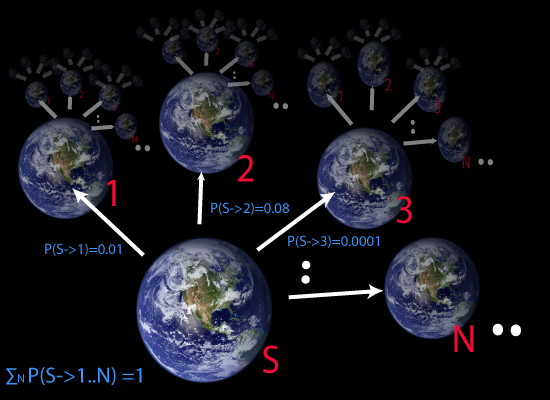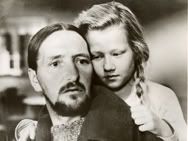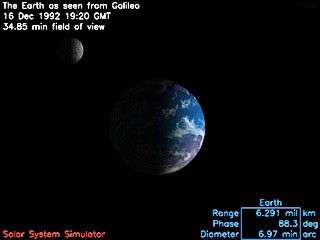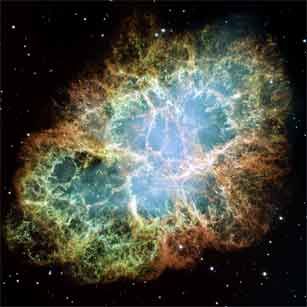
........I will not attempt to evaluate all that is going on in modal logic these days vis a vi "possible worlds." It's a vast field and it's becoming a booming industry for philosophy majors. I will argue that for those who advocate a Tillich-Balthasar from of theology--God as being itself, super essential Godhead--there can be no possible worlds without God. The point of possible worlds was initially to illustrate the notions of necessity and contingency. the concept of the possible world was used as far back as Libenitz (1646-1716) but their major use now seems to be in connection with necessity and contingency in modal logic.
The first is an Aristotelian approach that says a non-actual event is possible is to say that some actual substances could have initiated a causal chain that could lead up to the event in question. However, it can be shown that some plausible global possibility claims can be made true on this account only if there is a necessarily existent first cause (or aggregate of first causes) capable of initiating very different universes. On the other hand, Leibniz made possible worlds be ideas in the mind of an omniscient necessarily existent deity. Leibniz fails to explain what it is that makes these possible worlds possible, but if we were willing to combine his story with the conclusion drawn from the Aristotelian one, we could get the following story: Possible worlds are ideas in the mind of an omniscient deity and what makes them possible is that this deity has the Aristotelian capability of initiating causal chains that can lead to them being actualized.[1]
.......I am only interested in them in so far as they are used by atheists to argue against the existence of God. The main way this works is to find some bogus reason to stipulate that God could not exist in such and such a world if certain conditions prevailed. Then they assert that if this is the case in a possible world than it must be the case in our world, because God would have to be in all possible worlds. If there is a possible world where there would be no God then there can't be one here. They can't assert that just imagining a world with no God proves no God in this world. Such an approach is merely cheating becuase it just begs the question outright. Yet I have seen many of them take this approach. One of the major things they do is to assert based upon their unbelief in this world that they can imagine a possible world with no God. So since they can do that that must be a possible world, since they can imagine it being possible. That's clearly begging the question since they are just asserting that this really a world with no God. It's not good just saying "I can imagine such a world" that does not make it such a world. The point of the exorcize is to illustrate necessity and contingency not to dictate reality by imagination.
......Here is an argument by Darth Pringle (on CARM) that I think illustrates perfectly the problem with these atheist arguments, (yes he manged to be wrong perfectly).
P1. If something is God then its non-existence entails a contradiction.Yes it does actually, that is the non-existence of a first cause does entail a contradiction. The problem is he's confusing his assertions about the nature of the world with a possible world. He asserts that because he can imagine the world with no first cause then it doesn't need one. If a first cause exists then by definition it is necessary that it exists becuase the whole concept of a first cause is a necessity upon which the existence of the universe id penned. Notice that he's just trying to make God contingent upon the universe. God's existence being determined by its relation to the universe. This comes out even more so in the support he offers for the premise:
P2. The non-existence of a first cause of this universe does not entail a contradiction.
C. Therefore, a first cause of this universe isn't God.
P1. If the non-existence of something is logically possible then it could have not existed at some point in the past and it could fail to exist at some point in the future. Because an eternal being cannot have failed to have existed at any point in the past and could not fail to exist at any point in the future by definition, it's existence (if it exists) must be logically necessary, otherwise it is logically impossible.P2 is definitely trying to make God contingent upon the universe. I've argued this before on CARM but I think it eludes their understanding: the existence of creation is necessary for God to hold the title "creator." So in that sense God's status as creator is contingent upon the world. That is not the same as saying that the divine essence is contingent upon the world. The title of God as creator is just the way we think about God it has nothing to do with weather or not there actually is a reality to God.
P2. The non-existence of this universe does not entail a contradiction. If this universe didn't exist then a first cause of this universe wouldn't exist obviously. Consequently, that something is the first cause of this universe is logically contingent upon the existence of this universe (even if the universe is ontologically contingent upon its cause). If we use possible world semantics to make this point we can say that there is a possible world in which this universe doesn't exist and so there is a possible world in which a first cause of this universe does not exist (even if this universe needs one). This makes the non-existence of a first cause of this universe logically possible (even if one exists or existed).
C. Follows validly from P1 & P2 if they are both true via modus tollens.[2]
......Now observe the rule of possible worlds in this argument. There is a possible world in which the cause of the universe does not exist. That's the same thing as saying there's a possible world in which the essence that created the world doesn't exist. It's only saying there is a world in which there in no first cause because there's no world there to create. That doesn't mean the thing that created it is not there. so that can't be an argument against the existence of God. The only thing is could possibly prove is that there is a circumstance under which God could exist without being the creator, that is there was no creation. If first causes exist at all they are necessary to existence of contingencies, so the only case in which there would be no first cause is if there is no world to cause. That does not rule out God.
.......Edward Feser has a couple of helpful observations: It's common among people doing modal logic or using possible worlds argument about God to try and dictate the existence of God based upon the essence of thing as ascertain by the properties existent in a possible world.
.
A common procedure is to characterize the essence of a thing as the set of properties it has in every possible world, a necessary truth as one that is true in every possible world, and so forth. For A-T, this gets things backwards. It is the essence of a thing that determines what will be true of it in every possible world, not what is true of it in every world that determines its essence. In general, it is incoherent to define modal notions like necessity and possibility in terms of possible worlds, since the notion of a “possible” world itself presupposes modality.[3]Properties do not determine essence, and they may vary from world to world without determining the existence or being of an essence. Feser points out the misleading nature of possible world arguments:
It is also often said that for God to be a necessary being is for Him to exist in every possible world. This too is at least very misleading. It leaves the impression that there are these things called “possible worlds” that have some kind of reality apart from God, and it turns out – what do you know! – that God happens to exist in every one of them, right alongside numbers, universals, and other necessarily existing abstract objects. To be sure, since possible worlds other than the actual one are themselves mere abstractions (unless you are David Lewis), they would not exist as concrete entities that God has not created. But the “possible worlds” account of God’s necessity nevertheless insinuates that that necessity is grounded in something other than God Himself – that what is possible or necessary in general is to be determined independently of God, with God’s own necessity in turn defined by reference to these independent criteria. For A-T, this is completely muddled. The reason God is necessary is that He is Pure Act or Subsistent Being Itself, not because He “exists in every possible world.” And since God just is Being Itself – rather than “a being” among other beings, existing in one possible world or in all – all possibilities and necessities whatsoever are themselves grounded in the divine nature, rather than in anything in any way independent of God.They leave the impression that possible worlds are competing for existence and that God is deepnednet upon them. It creates the impression that possible worlds are possible apart fom God.
......This the raises what I think is the background misconception that all such atheist arguments make, that because they assume they are observing a possible world in which there is no God when they observe this one (which is also an actual world) then it is the case that there must be other possible worlds with no God. They are just borrowing doubt from this world to construct an argument which is question begging. Another problem is the seem to think that possible worlds are any world they can imagine. So if they imagine a world with square circles that's a possible world even though they don't actually imagine the square circles per se. But possible have to be logically possible. That's the whole point of calling it "possible" in the first place, it has to actually be possible. So if the God argument they seek to answer is the idea that God is not separable from being, since God is being itself, they can't claim a possible world in which there is being itself merely becuase they imagine they can do without the idea.
......I argue that since being has to be and God is being itself, all being is indicative of God. If a possible world contains any sort of being, even if it's just one subatomic particle there's a reason to assume God. This is so because being itself is the basis of what being is apart from any particular given instance of it. We can't assert contingencies without necessities and we can't assert a universe without a first cause if there is a first cause at all. We can't assert being without a ground of being since the beings are just contingencies that are hung upon eternal necessary being.
Sources
[1] Alexander Robert Pruss, POSSIBLE WORLDS:WHAT
THEY ARE GOOD FOR AND WHAT THEY ARE Ph.D. dissertation online copy URL: http://www9.georgetown.edu/faculty/ap85/papers/philthesis.html
[2] Darth Pringle on carmURL: http://forums.carm.org/vbb/archive/index.php/t-45426.html?s=4410c0ea94c5e2c8a36e5c8d66c5b047
[3] Edward Feser, "God and Possible Worlds," Edward Feser (a blog) url: http://edwardfeser.blogspot.com/2010/06/god-and-possible-worlds.html




